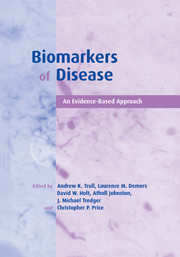Book contents
- Frontmatter
- Contents
- List of contributors
- Preface
- Part 1 Assessing and utilizing the diagnostic or prognostic power of biomarkers
- Part 2 Biomarkers of kidney disease and dysfunction
- 5 Biomarkers in renal disease
- 6 The genetics of renal disease
- 7 Early markers of nephrotoxicity for environmental and occupational monitoring
- 8 The early detection of renal impairment in diabetes mellitus. The case for microalbuminuria and other biomarkers
- Part 3 Biomarkers of bone disease and dysfunction
- Part 4 Biomarkers of liver disease and dysfunction
- Part 5 Biomarkers of gastrointestinal disease and dysfunction
- Part 6 Biomarkers in toxicology
- Part 7 Biomarkers of cardiovascular disease and dysfunction
- Part 8 Biomarkers of neurological disease and dysfunction
- Part 9 Biomarkers in transplantation
- Index
6 - The genetics of renal disease
Published online by Cambridge University Press: 20 August 2009
- Frontmatter
- Contents
- List of contributors
- Preface
- Part 1 Assessing and utilizing the diagnostic or prognostic power of biomarkers
- Part 2 Biomarkers of kidney disease and dysfunction
- 5 Biomarkers in renal disease
- 6 The genetics of renal disease
- 7 Early markers of nephrotoxicity for environmental and occupational monitoring
- 8 The early detection of renal impairment in diabetes mellitus. The case for microalbuminuria and other biomarkers
- Part 3 Biomarkers of bone disease and dysfunction
- Part 4 Biomarkers of liver disease and dysfunction
- Part 5 Biomarkers of gastrointestinal disease and dysfunction
- Part 6 Biomarkers in toxicology
- Part 7 Biomarkers of cardiovascular disease and dysfunction
- Part 8 Biomarkers of neurological disease and dysfunction
- Part 9 Biomarkers in transplantation
- Index
Summary
Introduction
As in other fields of genetics, two approaches have been combined in the genetics of human kidney diseases in order to locate and identify loci and genes: positional cloning (previously termed reverse genetics) and the candidate gene approach. Both approaches have been successful in inherited monogenic renal diseases, often successively. Positional cloning is based on linkage analysis in families using polymorphic markers – mainly microsatellites. The candidate gene approach may either follow localization of the morbid locus by positional cloning or derive from an a priori hypothesis based on cell physiology/biology. After cloning of the gene of interest, mutations have to be found which segregate with the disease in families. Various techniques are used to identify mutations: Southern hybridization (to detect gross rearrangements), polymerase chain reaction (PCR)-based approaches, such as single strand conformational polymorphism (SSCP), denaturing gradient gel electrophoresis (DGGE) or direct DNA sequencing, and new DNA technology (see below). Either genomic or complementary DNA can be studied. Even if the gene expression is tissue specific, one can take advantage of the illegitimate transcription of any gene in any cell type in order to study accessible cells easily, such as lymphocytes. Abnormal transcripts can, therefore, be identified by using PCR amplification of lymphocyte mRNA.
Today, most of the genes implicated in inherited kidney disorders have been localized, and many of them have been cloned. We are entering the ‘post-gene era’.
- Type
- Chapter
- Information
- Biomarkers of DiseaseAn Evidence-Based Approach, pp. 56 - 65Publisher: Cambridge University PressPrint publication year: 2002



